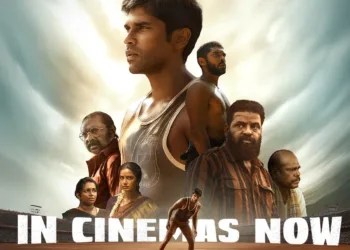The announcement of the 71st National Awards celebrating stellar performances by Shah Rukh Khan, Rani Mukerji, and Vikrant Massey has sparked an important conversation about industry recognition. Rupali Ganguly, the beloved face behind television’s most-watched show Anupamaa, has raised a crucial question that resonates with the entire TV fraternity: Why are television actors consistently overlooked by India’s most prestigious film awards?
Table of Contents
Rupali Ganguly Heart of Argument
In a candid conversation with Viral Bhayani, Rupali Ganguly expressed her disappointment that TV actors were not considered for the National Award despite their nonstop hard work and dedication in delivering continuous entertainment. Her frustration stems from a glaring disparity in how different entertainment mediums are valued.

“Aaj content creators ke liye National Award hai, films har regional cinema har kisi ke liye National Award hai lekin Television waalo ke liye nahi hai,” Ganguly pointed out, highlighting how even content creators now receive recognition while TV actors remain invisible.
TV vs Film Industry: A Reality Check
| Aspect | Television Industry | Film Industry |
|---|---|---|
| Work Schedule | 12+ hours daily, 365 days | Project-based, 2-3 months |
| COVID-19 Response | Continued shooting with restrictions | Production halts and postponements |
| Content Output | Daily episodes for years | One film per project |
| Recognition | Limited to TV-specific awards | National Awards, international recognition |
| Media Coverage | Minimal mainstream attention | Extensive coverage for short shoots |
The Anupamaa star made a particularly striking observation: “Jab ek film star nikal kar shoot karta hai 2 din toh uske liye bohot badi news ban jaati hai lekin puri TV industry Covid mai shoot kar rahi thi voh news nahi bani” (When a film star shoots for two days, it becomes big news, but the entire television industry filming during COVID didn’t get similar attention).
The COVID-19 Reality: TV Industry’s Unsung Heroism
During the pandemic, while film productions worldwide came to a standstill, television actors demonstrated unprecedented dedication. Ganguly recalled how “TV waale roz lage hue the, subhese 6 baje se lekar shaamke 6 baje tak, jab tak curfew time tha” (TV actors worked daily from 6 AM to 6 PM until curfew time).
This commitment ensured that millions of viewers had uninterrupted entertainment during the world’s most challenging period. Yet, this sacrifice went largely unrecognized by mainstream media and award committees.

Smriti Irani’s Return: A Ray of Hope
Rupali’s optimism stems from Smriti Irani’s return to television with Kyunki Saas Bhi Kabhi Bahu Thi. She believes this high-profile comeback might create positive momentum toward television recognition at national platforms.
“It is such a big validation for a person of that stature to come to the medium that I love most,” Ganguly shared, hoping that Smriti’s return might pave the way for better representation of TV actors in prestigious awards.
The Broader Impact on Television Industry
The lack of National Award recognition affects more than just individual actors—it impacts the entire television ecosystem:
Creative Quality: Without prestigious recognition, there’s less incentive for acclaimed directors and writers to explore television as a serious artistic medium.
Industry Status: The absence of National Award categories perpetuates the perception that television is somehow inferior to cinema.
Talent Migration: Promising actors often view TV as a stepping stone rather than a destination, leading to talent drain.
For comprehensive coverage of television industry trends and celebrity interviews, explore our entertainment analysis and celebrity news coverage.
Why Television Deserves National Recognition
Television actors like Rupali Ganguly have proven their mettle through consistent performances spanning years. Anupamaa alone has maintained the top TRP position for years, reaching millions of households daily. Such sustained excellence deserves recognition at the highest level.
The medium has evolved significantly, with shows now featuring movie-quality production values, complex narratives, and stellar performances that rival any cinematic offering.
A Call for Change
Rupali’s statement isn’t just criticism—it’s a call for systemic change in how India values different forms of entertainment. She urged the government to consider TV actors for the National Award, expressing that “it would be an honour if television actors also received this recognition”.
The television industry’s contribution to Indian culture, economy, and entertainment cannot be understated. Daily soaps have shaped social conversations, influenced fashion trends, and provided employment to thousands of artists, technicians, and support staff.
The Path Forward
With digital platforms blurring the lines between cinema and television, the time has come to reconsider award categories. Many international awards ceremonies already recognize television alongside cinema, understanding that quality content deserves recognition regardless of platform.
Stay updated with the latest television industry news and celebrity interviews at TechnoSports. For official updates on National Awards, visit National Film Awards.
Frequently Asked Questions
Q: Why aren’t television actors eligible for National Film Awards in India?
A: The National Film Awards specifically recognize cinema and non-feature films, excluding television content. This categorization hasn’t evolved to include TV performances despite the medium’s growth and quality improvement over decades.
Q: How does the workload of TV actors compare to film actors?
A: Television actors typically work 12+ hours daily for months or years on a single show, shooting 365 days with minimal breaks. Film actors work intensively for 2-3 months per project with longer gaps between films, making TV work significantly more demanding in terms of consistency and volume.








